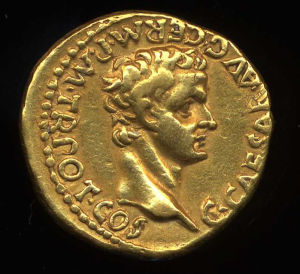Server check!
You are on the training database
Caligula
Reece Period attributed: Period 1

Member of the Julio-Claudians dynasty.
Coins for this issuer were issued from 37 until 41.
Gaius Julius Caesar Augustus Germanicus (August 31, 12 - January 24, 41), most commonly known as Caligula, was the third Roman Emperor and a member of the Julio-Claudian dynasty, ruling from 37 to 41. Known for his extreme extravagance, eccentricity, depravity and cruelty, he is remembered as a despot. He was assassinated in 41 by several of his own guards.
The Roman historian Suetonius referred to Caligula as a "monster", and the surviving sources are universal in their condemnation. One popular tale, often cited as an example of his insanity and tyranny, is that Caligula appointed his favorite horse, Incitatus, to a seat on the senate and attempted to appoint it to the position of consul. The story, however, owes its unrelenting currency to its charm: it is based on a single misunderstood near-contemporary reference, in which Suetonius merely repeats an unattributed rumour that Caligula was thinking about doing it (Suet. Cal. 55.3).
Caligula is often alleged to have had incestuous relationships with his sisters, most notably his younger sister Drusilla, but there is no credible evidence to support such claims either. In short, the surviving sources are filled with anecdotes of Caligula's cruelty and insanity rather than an actual account of his reign, making any reconstruction of his time as Princeps nearly impossible. What does survive is the picture of a depraved, hedonistic ruler, an image that has made Caligula one of the most widely recognizable, if poorly documented, of all the Roman Emperors; the name "Caligula" itself has become synonymous with wanton hedonism, cruelty, tyranny, and insanity.
Other resources about Caligula
- Dbpedia: http://dbpedia.org/resource/Caligula
- Wikipedia: http://en.wikipedia.org/wiki/Caligula
- VIAF: http://viaf.org/viaf/59052351
- Nomisma: http://nomisma.org/id/gaius
View all coins recorded by the scheme attributed to Caligula.
Information from Wikipedia

- Preferred label: Caligula
- Full names:
- Caligula
- Father: Germanicus
- Mother: Agrippina the Elder
- List of Roman emperors
- List of Roman consuls
- Gaius Caninius Rebilus (consul 37)
- Aulus Caecina Paetus
- Quintus Terentius Culleo
- Gaius Laecanius Bassus (consul 40)
- Servius Asinius Celer
- Gnaeus Domitius Afer
- Gnaeus Acerronius Proculus
- Gaius Petronius Pontius Nigrinus
- Aulus Didius Gallus
- Quintus Terentius Culleo
- Sextus Nonius Quinctilianus (consul 38)
- Gaius Laecanius Bassus (consul 40)
- Julio-Claudian dynasty
- Politicide perpetrators
- Julii Caesares
- Burials at the Mausoleum of Augustus
- Roman pharaohs
- People with epilepsy
- 1st-century murdered monarchs
- Capri, Campania
- People from Anzio
- 41 deaths
- Roman emperors murdered by the Praetorian Guard
- Caligula
- Roman quaestors
- 12 births
- Deaths by stabbing in Rome
- Children of Germanicus
- Assassinated heads of state
- Incest
- Roman emperors to suffer posthumous denigration or damnatio memoriae
- Royalty and nobility with disabilities
- 1st-century Roman emperors
Types issued
- RIC I (second edition) Gaius/Caligula 1 Issued: AD 37 - AD 38
- RIC I (second edition) Gaius/Caligula 10 Issued: AD 37 - AD 38
- RIC I (second edition) Gaius/Caligula 11 Issued: AD 37 - AD 38
- RIC I (second edition) Gaius/Caligula 12 Issued: AD 37 - AD 38
- RIC I (second edition) Gaius/Caligula 13 Issued: AD 37 - AD 38
- RIC I (second edition) Gaius/Caligula 14 Issued: AD 37 - AD 38
- RIC I (second edition) Gaius/Caligula 15 Issued: AD 37 - AD 38
- RIC I (second edition) Gaius/Caligula 16 Issued: AD 37 - AD 38
- RIC I (second edition) Gaius/Caligula 17 Issued: AD 37 - AD 38
- RIC I (second edition) Gaius/Caligula 18 Issued: AD 37 - AD 38
- RIC I (second edition) Gaius/Caligula 19 Issued: AD 37 - AD 38
- RIC I (second edition) Gaius/Caligula 2 Issued: AD 37 - AD 38
- RIC I (second edition) Gaius/Caligula 20 Issued: AD 38 - AD 39
- RIC I (second edition) Gaius/Caligula 21 Issued: AD 40 - AD 40
- RIC I (second edition) Gaius/Caligula 22 Issued: AD 40 - AD 40
- RIC I (second edition) Gaius/Caligula 23 Issued: AD 40 - AD 40
- RIC I (second edition) Gaius/Caligula 24 Issued: AD 40 - AD 40
- RIC I (second edition) Gaius/Caligula 25 Issued: AD 40 - AD 40
- RIC I (second edition) Gaius/Caligula 26 Issued: AD 40 - AD 40
- RIC I (second edition) Gaius/Caligula 27 Issued: AD 40 - AD 40
- RIC I (second edition) Gaius/Caligula 28 Issued: AD 40 - AD 40
- RIC I (second edition) Gaius/Caligula 29 Issued: AD 40 - AD 41
- RIC I (second edition) Gaius/Caligula 3 Issued: AD 37 - AD 38
- RIC I (second edition) Gaius/Caligula 30 Issued: AD 41 - AD 41
- RIC I (second edition) Gaius/Caligula 31 Issued: AD 41 - AD 41
- RIC I (second edition) Gaius/Caligula 32 Issued: AD 37 - AD 38
- RIC I (second edition) Gaius/Caligula 33 Issued: AD 37 - AD 38
- RIC I (second edition) Gaius/Caligula 34 Issued: AD 37 - AD 38
- RIC I (second edition) Gaius/Caligula 35 Issued: AD 37 - AD 38
- RIC I (second edition) Gaius/Caligula 36 Issued: AD 37 - AD 38
- RIC I (second edition) Gaius/Caligula 37 Issued: AD 37 - AD 38
- RIC I (second edition) Gaius/Caligula 38 Issued: AD 37 - AD 38
- RIC I (second edition) Gaius/Caligula 39 Issued: AD 39 - AD 39
- RIC I (second edition) Gaius/Caligula 4 Issued: AD 37 - AD 38
- RIC I (second edition) Gaius/Caligula 40 Issued: AD 39 - AD 40
- RIC I (second edition) Gaius/Caligula 41 Issued: AD 39 - AD 40
- RIC I (second edition) Gaius/Caligula 42 Issued: AD 39 - AD 40
- RIC I (second edition) Gaius/Caligula 43 Issued: AD 39 - AD 40
- RIC I (second edition) Gaius/Caligula 44 Issued: AD 39 - AD 40
- RIC I (second edition) Gaius/Caligula 45 Issued: AD 39 - AD 40
- RIC I (second edition) Gaius/Caligula 46 Issued: AD 39 - AD 40
- RIC I (second edition) Gaius/Caligula 47 Issued: AD 39 - AD 40
- RIC I (second edition) Gaius/Caligula 48 Issued: AD 40 - AD 41
- RIC I (second edition) Gaius/Caligula 49 Issued: AD 40 - AD 41
- RIC I (second edition) Gaius/Caligula 5 Issued: AD 37 - AD 38
- RIC I (second edition) Gaius/Caligula 50 Issued: AD 40 - AD 41
- RIC I (second edition) Gaius/Caligula 51 Issued: AD 40 - AD 41
- RIC I (second edition) Gaius/Caligula 52 Issued: AD 40 - AD 41
- RIC I (second edition) Gaius/Caligula 53 Issued: AD 40 - AD 41
- RIC I (second edition) Gaius/Caligula 54 Issued: AD 40 - AD 41
- RIC I (second edition) Gaius/Caligula 55 Issued: AD 37 - AD 41
- RIC I (second edition) Gaius/Caligula 56 Issued: AD 37 - AD 41
- RIC I (second edition) Gaius/Caligula 57 Issued: AD 37 - AD 41
- RIC I (second edition) Gaius/Caligula 58 Issued: AD 37 - AD 41
- RIC I (second edition) Gaius/Caligula 59 Issued: AD 37 - AD 38
- RIC I (second edition) Gaius/Caligula 6 Issued: AD 37 - AD 38
- RIC I (second edition) Gaius/Caligula 60 Issued: AD 37 - AD 38
- RIC I (second edition) Gaius/Caligula 61 Issued: AD 37 - AD 38
- RIC I (second edition) Gaius/Caligula 62 Issued: AD 37 - AD 38
- RIC I (second edition) Gaius/Caligula 63 Issued: AD 37 - AD 38
- RIC I (second edition) Gaius/Caligula 7 Issued: AD 37 - AD 38
- RIC I (second edition) Gaius/Caligula 8 Issued: AD 37 - AD 38
- RIC I (second edition) Gaius/Caligula 9 Issued: AD 37 - AD 38
Denominations issued
- As - view all records of this denomination issued by Caligula
- Aureus (Republic/Empire) - view all records of this denomination issued by Caligula
- Denarius (Empire) - view all records of this denomination issued by Caligula
- Dupondius - view all records of this denomination issued by Caligula
- Sestertius - view all records of this denomination issued by Caligula
- Semis - view all records of this denomination issued by Caligula
- Dupondius or as - view all records of this denomination issued by Caligula
- Quadrans - view all records of this denomination issued by Caligula
- Quinarius - view all records of this denomination issued by Caligula
- Medallion - view all records of this denomination issued by Caligula
Issuing mints
This video has been embedded from Adrian Murdoch's series of podcasts on the Emperors of Rome. Many thanks to him for allowing us to use these podcasts.


